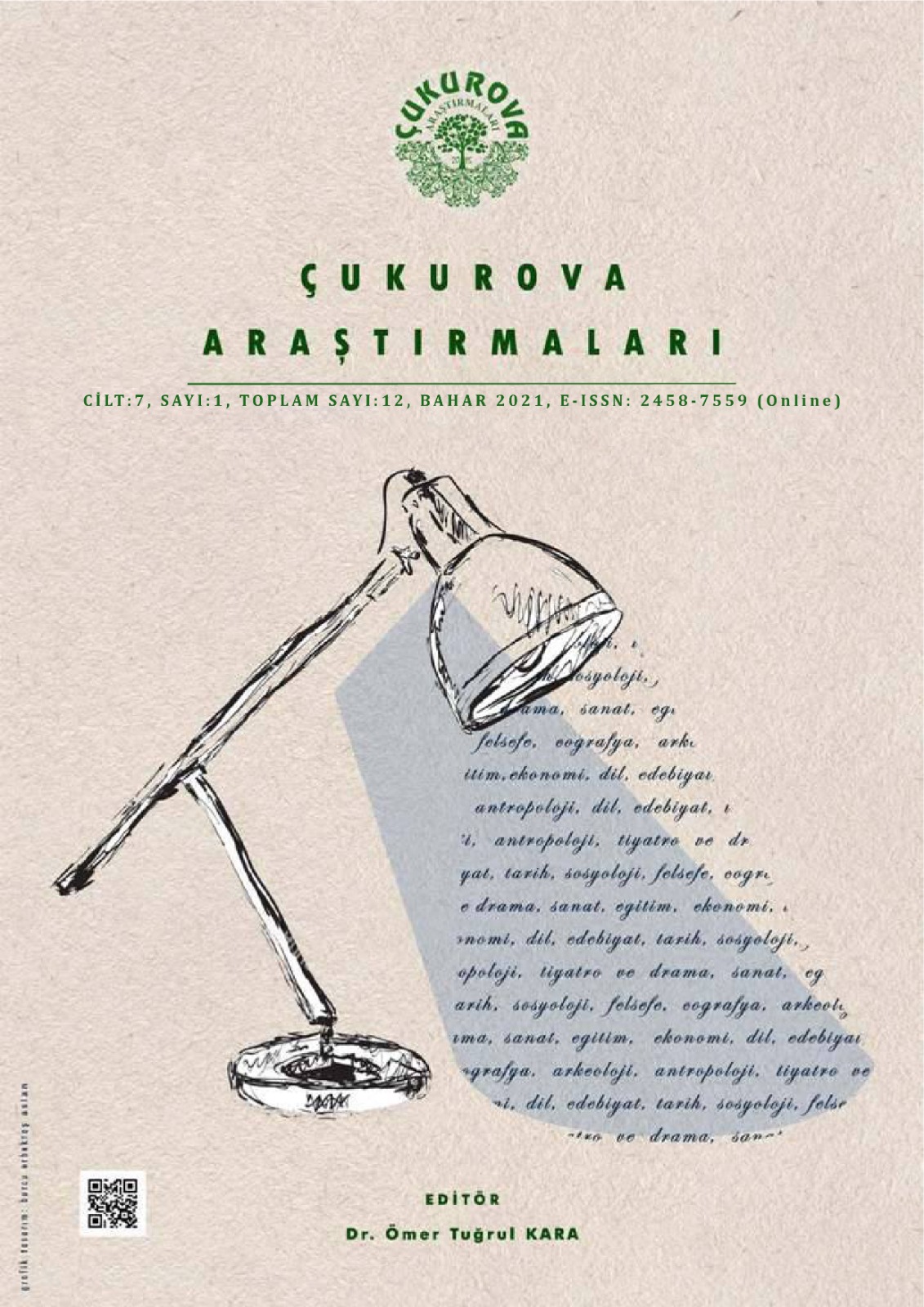Author :
Abstract
Ders kitapları, ait olduğu dersin öğretim programına göre hazırlanan temel materyallerdir. Bir ders kitabı farklı yönleriyle öğretim programında yer alan unsurlar bakımından incelenip değerlendirilmelidir. Bu incelemeler ders kitaplarındaki eksikliklerin tamamlanması ve iyileştirilmesi bakımından önemlidir. Bu çalışmanın amacı Türkçe ders kitaplarında, Türkçe Dersi Öğretim Programı’nda yer alan yöntem ve tekniklerden hangilerine ne sıklıkta yer verildiğini belirlemektir. Çalışmada nitel araştırma desenlerinden doküman analizi kullanılmıştır. Çalışma materyali olarak 2019-2020 eğitim öğretim yılında okutulan ortaokul Türkçe ders kitapları kullanılmıştır. Ders kitaplarında her bir sınıf düzeyinde ayrı ayrı olmak üzere 8’er dinleme/ izleme metni bulunmaktadır. Metin ve etkinliklerden hareketle öğrenciden kullanılması istenen yöntem ve teknikler tespit edilmiştir. Etkinlikler incelendiğinde bazı dinleme/ izleme metinlerinde birden fazla yöntem ve tekniğin birlikte kullanıldığı görülmüş, her biri ayrı bir frekans olarak ele alınmıştır. Araştırmada elde edilen bulgulara göre toplamda 5. sınıf düzeyinde 11; 6. sınıf düzeyinde 12; 7. sınıf düzeyinde 14 ve 8. sınıf düzeyinde 13 kez dinleme/ izleme yöntem ve tekniklerine başvurulmuştur. 5. sınıf düzeyinde katılımsız ile eleştirel dinleme/ izleme; 6. Sınıf düzeyinde katılımsız, eleştirel ve kendini karşısındakinin yerine koyarak dinleme/ izleme yöntem ve tekniklerine yer verilmemiştir. 7. Sınıf düzeyinde ise katılımlı ve katılımsız dinleme/ izleme yer verilmeyen yöntemler arasındadır. 5, 6 ve 7. Sınıf düzeyinde ortak olarak yer verilmeyen yöntem katılımsız dinleme/ izleme iken, 8. Sınıflarda yer verilmeyen tek yöntem yaratıcı dinleme/ izlemedir. Bütün sınıf düzeylerinde en sık kullanılan dinleme/izleme yöntemi, not alarak dinleme/ izleme olarak belirlenmiştir.
Keywords
Abstract
School books are the basic materials which are prepared in respect of the curriculum the lesson belongs to. A school book must be examined on its different aspects according to the elements that exists in the curriculum. This examine is essential in terms of enhancing and completing the deficiency of the school book. The purpose of this research is to clarify the methods and techniques that are the parts of Turkish Lecture Curriculum that are taken into Turkish school books, and what frequency that are mentioned in the book and which methods and techniques are added to the book. In this study, document analysis of qualitative research pattern is used. As the research material, Turkish lecture school book of 2019-2020 year of study for secondary schools is used. In these school books, there are 8 listening/ monitoring texts that are special for each class’ level. According to these texts and activities, the methods and techniques that are asked from the students to use have been detected. When the activities are analysed, in some of the listening/ monitoring texts, it has been seen that multiple techniques are used in them and each one of them are approached by a different frequency. As to the research, in 5th grade level, there are 11; in 6th grade level there are 12; in 7th grade level there are 14 and in 8th grade level, there are 13 listening/ monitoring methods and techniques employed. In 5th grade level, unattended and critical listening/ monitoring; in 6th grade, unattended, critical and empathetic listening/ monitoring methods and techniques are not allowed. In 7th grade level, attended and unattended listening/ monitoring are the methods that are not allowed. While in 5, 6 and 7th grades not-allowed mutual methods are unattended listening / monitoring; in 8th grades only not-allowed listening/ monitoring method is creative listening/ monitoring method. In all grades, the mostly used listening/ monitoring method is found notating listening/ monitoring method.
Keywords
- Anderson, H. (1949).Teaching the art of listening. Scool Review. 57, 63-67.
- Anderson, H. (1949).Teaching the art of listening. Scool Review. 57, 63-67.
- Brown, J.I. (1954). How teachable ıs listening?. Educational Research Bulletin, 33(4). Doğan, Y. (2016). Dinleme eğitimi. Ankara. Pegem A. Yayınları.
- Ergin, A. ve Birol, C. (2000). Eğitimde iletişim. Ankara. Anı Yayıncılık.
- Güneş, F. (2019). Türkçe öğretimi: yaklaşımlar ve modeller. Ankara. Pegem A. Yayınları.Güzel A. ve Karatay H. (2019). Türkçe öğretimi el kitabı. Ankara. Pegem A. Yayınları.
- Johnson, K. O. (1951). The effect of clssroom training upon listening comprehenson. The Journal of Communication. I, 58.
- Kurudayıoğlu, M. ve Örge Yaşar, F. (2014). 6. sınıf Türkçe dersi öğretmen kılavuz kitaplarındaki dinlememetinlerinin dinleme yöntem ve teknikleri açısından incelenmesi. Ana Dili Eğitimi Dergisi, 2(2), 1- 14.
- Millî Eğitim Bakanlığı. (2006). İlköğretim Türkçe dersi (6,7, 8. sınıflar) öğretim programı. Talim ve Terbiye Kurulu Başkanlığı, Ankara.
- Millî Eğitim Bakanlığı. (2019). Türkçe dersi öğretim programı. Talim ve Terbiye Kurulu Başkanlığı, Ankara.Millî Eğitim Bakanlığı. (2019). Ortaokul ve imam hatip ortaokulu Türkçe ders kitabı 5. sınıf. Millî Eğitim Bakanlığı Yayınları, Ankara.
- Millî Eğitim Bakanlığı. (2019). Ortaokul ve imam hatip ortaokulu Türkçe ders kitabı 6. sınıf. Millî EğitimÖzçelik, D.A. (1992). Eğitim programları ve öğretim. Ankara: ÖSYM Yayınları.Özbay, M. (2009). Anlama teknikleri – ıı: dinleme eğitimi. Ankara: Öncü Kitap.
- Özbay, M. ve Melanlıoğlu, D. (2012). Türkçe öğretim programlarının dinleme becerisi bakımından değerlendirilmesi. Turkish Studies, 7(1), 87-97.
- Özbay, M.(2002). Türkçe öğretiminde ihmal edilmiş bir alan dinleme eğitimi. Cumhuriyetimizin 80. Yılında Türkçemiz Sempozyumu. Ankara: ANAÇEV Yayınları. s.97-104.
- Sönmez, V. ve Alacapınar, F. G. (2019). Örneklendirilmiş bilimsel araştırma yöntemleri. Ankara: Anı Yayıncılık.
- Université Laval. (2001). L’écoute en Classe et la Prise de Notes, I’Université Laval.
- Yıldırım, A. ve Şimşek, H. (2018). Sosyal bilimlerde nitel araştırma yöntemleri. Ankara: Seçkin Yayıncılık.
